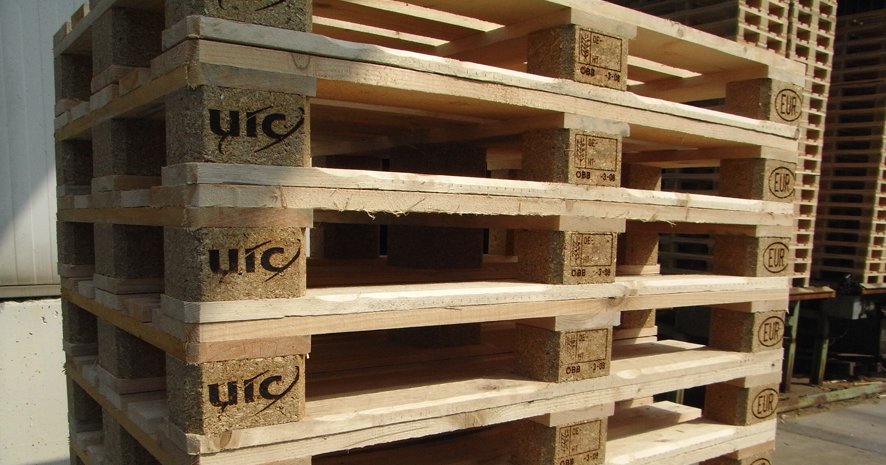According to a recent study done in Australia, a wooden pallet’s carbon footprint for completing 100 trips is 144 kgCO2-e. While this may seem like a bloated figure to the untrained eye, researchers have revealed that plastic pallets emit 50% more emissions for the same 100 trips.
But when it comes to the environmental impact and sustainability of wood pallets, this barely scratches the surface.
If you’re thinking about improving your supply chain and logistics processes, it might be time to think about incorporating wood pallets.
So, are you ready to discover how investing in sustainability can help both you and the planet make a profit?
Let’s talk about it.

What Is the Environmental Impact of Wood Pallets?
Wood pallets play a crucial role in global logistics and have greatly contributed to the health and well-being of the planet over the years. According to the European Pallet Association e.V. (EPAL) and corroborating the statements made by the study mentioned above, wood pallets fully support sustainability goals and a functioning circular economy.
While there are a million and one ways to help the environment, switching to wooden pallets for transportation and storing could open the door to a wealth of additional options and resources.
Unfortunately, some still think wood pallet use is a massive contributor to deforestation and are quick to dismiss it altogether. Of course, wood pallets do harvest natural resources, but there are myriad ways to reduce this impact.
For example, many companies harvest trees from land plots specifically created for lumber harvesting in a bid to protect the forests. Or, manufacturers train staff in recycling and upcycling wood pallets to ensure reusability and an extended lifespan that reduces carbon emissions even more.
Times are changing, but the wood pallet industry refuses to fall behind.
Are Wooden Pallets Bad for the Environment?
In essence, no.
But when irresponsible manufacturers and suppliers get their hands on perfectly sustainable wood pallets, they can still use them in a non-environmentally friendly way.
So, how do you manage this?
Choose Responsible Manufacturers
If your business values sustainability and wants to limit deforestation and irresponsible logging, do your due diligence before choosing a manufacturer. Before you put pen to paper, ask how the manufacturer regards sustainability issues and whether they have an environmentally friendly process in place.
For example, a good manufacturer/supplier will not contribute to deforestation, will minimize damage to the forest ecosystems as much as possible, and will source wood using selective harvesting policies.
In a nutshell, you don’t want your wood pallet manufacturer recklessly cutting down trees to make an average-quality wood pallet you can’t even recycle. So, ask the hard questions beforehand.
Opt for Softwood
Softwood trees are evergreen trees, such as pine, cedar, and spruce. On the other hand, hardwood trees are oak, walnut, and maple.
Hardwood trees grow very slowly and may need up to 150 years before they’re ready for harvesting. On the other hand, softwood trees grow quickly and can be ready for harvesting in as little as 40 years. In turn, this means that the trees that grow faster (softwood) are easier to source, cheaper, and don’t contribute as much to deforestation.
If you have the option to do so, ask your manufacturer to create wood pallets out of softwood instead of hardwood. While at Gama Design we use both types of wood depending on the need, you can ask for a specific type if you have a preference. Of course, ensure the softwood can handle your load without collapsing or damaging your items before you get a quote. And if you’ve got any questions, contact us so we can discuss your options.
Recycle Your Wood Pallets
Ever since we’ve begun paying more attention to sustainability claims, the pallet industry has discussed pallet recycling. Wood pallet recycling is the process of reusing and repurposing wooden pallets that are no longer fit for their original use. By giving old pallets a new life, companies help reduce waste and conserve natural resources.
The EPAL emphasizes that “high-quality” recycling should refer to upcycling, as well as closed-loop recycling. Namely, authoritative bodies should also consider pallets recycled when turned into wood chips for production purposes, not only when the material lends well to the same or a similar application.
So, ask your manufacturer if they can recycle your pallets for you so that you can reuse them and help the planet simultaneously.
Conclusion
By ensuring you’re working with manufacturers who source wood responsibly, promote reusing and recycling, and choose environmentally friendly treatments, you can significantly minimize your operations’ environmental footprint.
As we collectively strive for a more sustainable future, wooden pallets may have an even bigger and more valuable role in global logistics. And we can’t wait to see that happen.
